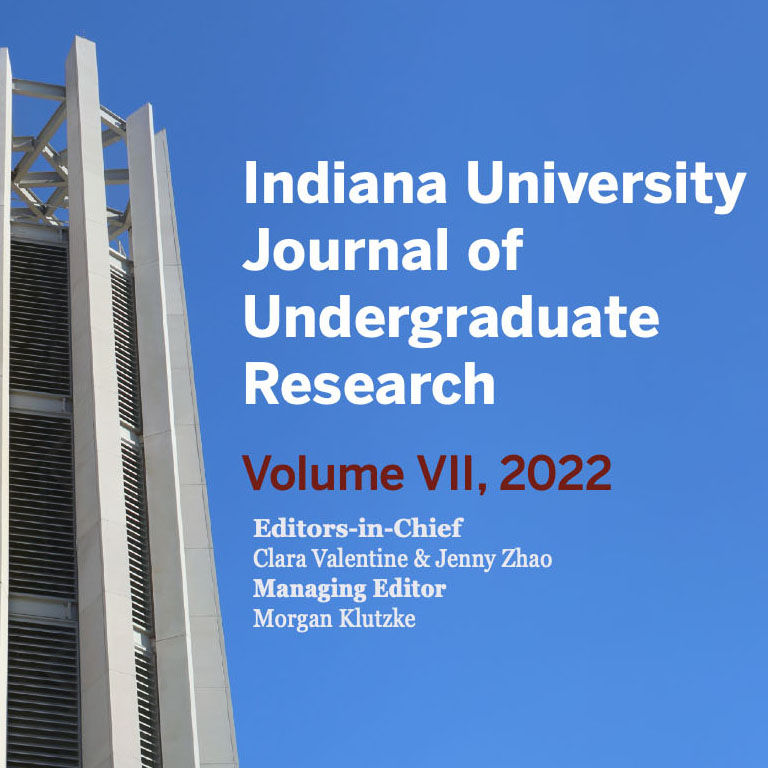The Indiana University Journal of Undergraduate Research has published a new volume! Volume VII of IUJUR highlights some of the exceptional research IU undergraduates produce while pursuing their degrees. IUJUR is a student-run, interdisciplinary journal that provides opportunities for undergraduates to publish their work and to develop a deeper understanding of academic research and publishing. The journal and its associated student organization are supported by the Office of the Vice Provost of Undergraduate Education and the Scholarly Communication Department at IU Bloomington Libraries. We congratulate the authors, editors, and the entire IUJUR team for their hard work and commitment in producing this volume.

In “Three Strikes and You’re Out: The Demographics of Indiana’s Habitual Offender Law”, Isaac Thuesen makes an important contribution to the research on habitual offender laws by investigating the potentially inequitable application of these laws among an understudied population. Thuesen notes that all previous studies supporting connections between habitual offender laws and racial bias have focused only on the state of Florida. By using sentencing data from Marion County, Indiana, his study “aims to fill the gap in the literature by examining underlying trends in the application of the habitual offender law” (8).
While Thuesen finds “a pattern of inequality in the application of Indiana’s habitual offender law”, some of his results contradict the previous findings from Florida (12). As a whole, this study demonstrates the need for further scrutiny of these laws and points to several valuable avenues for future research.
Anita Sayar’s study, “The Effect of Familiar Music on Long-Term Declarative Memory in College Students”, examines a significant gap in the research on the impact of music on memory. Sayar’s work is the first to address the potential effect of familiar music on long-term declarative memory. In this carefully designed study, volunteer student participants studied for standardized memory tests either while listening to familiar music or while studying in silence. Their test results demonstrated that exposure to familiar music had minimal positive or negative effects on the long-term declarative memory of the participants. Sayar notes, however, that “such effects may be highly individualized” as some participants achieved significantly higher test scores with the aid of familiar music (20). Sayar also points out that a deeper understanding of the relationship between music and long-term memory may have implications for medical, educational, and psychological research. This study represents an important step in furthering that understanding.
In their analysis of COVID-19 vaccine hesitancy, “Influences and Willingness to Receive Future COVID-19 Vaccination by Demographic Data and Proposed Interventions,” Elisa Hachem and Alexis Daniello provide a useful breakdown of factors that may influence vaccine willingness and offer detailed recommendations for possible interventions. In analyzing their comprehensive online survey of 226 respondents, Hachen and Daniello find, for instance, a “statistically significant relationship between belonging to the Republican party and being less willing to receive a COVID-19 vaccine” (24). In addition, they find that the most commonly reported factors influencing vaccine decision making include primary scientific literature, physicians’ opinions, and personal health status. In light of these results, Hachen and Daniello make several practical recommendations to encourage higher vaccination rates. They suggest, for example, that potential vaccine interventions could be targeted to more Republican-leaning regions. They also recommend making scientific literature more accessible to non-experts and providing primary care physicians with plain-language vaccine pamphlets for their patients. To illustrate this, Hachen and Daniello provide a sample pamphlet in the appendix to their article. As vaccine hesitancy continues to impact public health, this research makes a welcome contribution to the knowledge on this topic.
In their exploration of important unanswered questions and their identification opportunities for further research, these articles are representative of the innovative work IU undergraduates are doing. The IUJUR staff is already at work on volume VIII, so expect to see more from them soon!
Leave a Reply